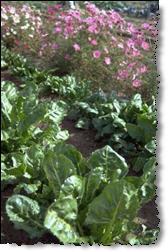

|
The best way to ensure that everything in your garden has been cultivated organically is to grow as much as possible from organic seeds. You can purchase organic garden seeds from suppliers, as well as maintain you own home-raised seed. Commercial organic seeds may either be certified as organically grown (and a bit more expensive) or non-certified.
Organic Fertilizer - The Keeper
of the Soil
Key to the whole process is the use of organic fertilizer and compost to create good soil. Such fertilizer consists only of animal and vegetable substances. The idea is to feed and nurture the soil, which in turn feeds the plant.
When the proper, natural fertility level of the soil is maintained by regular additions of organic matter, the plants will draw on the material as they need it. You supply the natural fertilizers for organic gardening, and nature will do the rest.
Organic Herbs and Vegetables
Fresh, organic vegetables are the pride of the natural gardener. Allow as much room as possible for the vegetable plot in full view of the sun.
If space is limited, the cottage garden design is an excellent solution for growing organic vegetables. This style of organic gardening uses close-planting techniques in which a mixture of ornamental and vegetable plants are grown in the same bed. Its a wonderful way to make maximum use of any available space. A natural result of this is organic weed control.
In fact, there are simple and healthy ways of practicing organic weed control, such as clearing, hoeing, and mulching. Some weeds are actually an asset to a gardens heath, and organic gardeners learn how to recognize the useful weeds from the bad.
There is nothing mystical about growing an organic garden. It is a mixture of traditional gardening and natural materials that produces food free from pollution, with the amazing tastes that nature intended!
Built by Champion Promotions Powered by SiteSell
www.lawn-and-gardening-tips.com
Copyright © by Robert Mosse, All rights reserved.
 Organic
gardening is the refreshing, healthy way of working with nature to grow
vegetables, herbs, fruits and flowers. So just what does it mean to "grow
organic?"
Organic
gardening is the refreshing, healthy way of working with nature to grow
vegetables, herbs, fruits and flowers. So just what does it mean to "grow
organic?"